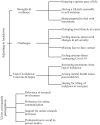Lockdown Experiences and Views on Future Research Participation of Autistic Adults in the UK During the First 6 Months of the COVID-19 Pandemic
- PMID: 37663442
- PMCID: PMC10468553
- DOI: 10.1089/aut.2022.0027
Lockdown Experiences and Views on Future Research Participation of Autistic Adults in the UK During the First 6 Months of the COVID-19 Pandemic
Abstract
Background: The COVID-19 pandemic resulted in large-scale public health restrictions and lockdowns across many countries. There is an increasing literature on the varied impact of such lockdowns in autistic adults. However, there is very little research on how the pandemic and related public health measures may impact the willingness of autistic people in engaging and taking part in research. The aim of this qualitative study was to explore autistic adults' experiences of the COVID-19 lockdown and how the pandemic may affect future research participation.
Methods: We conducted in-depth interviews with 31 autistic adults between March and July 2020. Transcripts were analyzed thematically within a critical realism framework.
Results: Participants identified positive aspects of lockdown such as enjoying the lack of social pressures and using their well-developed skills for dealing with uncertainty. Autistic people also shared challenges of adjusting to lockdown, for example, rapid change in daily routines. While hopeful about the freedom gained from easing restrictions, participants were concerned about the inconsistent communication and application of rules during the transition out of lockdown. This may have exacerbated already rising mental health issues among autistic people. The participants viewed research participation and engagement with increased relevance during the pandemic and welcomed efforts to conduct research using online methods of communication.
Conclusion: The COVID-19 lockdown had a varied effect in the lives and routines of autistic people. However, health care providers and researchers need to be mindful of rising mental health issues in the aftermath of the pandemic, especially for people who were already vulnerable. The response to the pandemic may have offered opportunities for innovation in research processes enabling more autistic people to engage with research and making studies more inclusive.
Keywords: COVID-19 pandemic; autism in adults; first lockdown experiences; qualitative study; trial methods.
Plain language summary
Why is this an important issue?: We did not know how the pandemic and the strict restrictions that followed would affect autistic people's well-being and mental health.Also, there was a worry that the pandemic would affect the number of volunteers taking part in research that matters the most to autistic people. Thus, it was important to understand any implications for the way we conduct research with the autistic community after the pandemic.
What was the purpose of this study?: We explored the experiences of autistic people living through the first 6 months of the COVID-19 lockdown in the United Kingdom. We were particularly interested in autistic people's views on how the pandemic may affect them taking part in research.
What did the researchers do?: We co-produced this interview study to answer our research questions. We carried out in-depth interviews with 31 autistic people. We looked for patterns or themes in what the participants said.
What were the results of the study?: Autistic people we interviewed reported being able to enjoy a quieter pace of life. They felt less anxious early in the lockdown. But they also faced great challenges adjusting to changes in their daily routines. Inconsistent public health communication caused worry during the transition out of lockdown. Unnecessary stress might have led to worsening of mental health issues in some people. Our participants held positive views on taking part in and engage with research, despite the pandemic. We identified opportunities that could make research more inclusive for autistic people, for example, online methods for taking consent and taking part in research remotely.
What do these findings add to what was already known?: Our study adds to the evidence of the varied responses of autistic people to the pandemic and the public health measures that it led to. One important strength of our work is our focus on the impact of the pandemic on research and implications of future research. We learnt that autistic people welcome and value the use of online technology to reach study participants. Wider use of remote technology can make research more inclusive and participatory.
What are potential weaknesses in the study?: Many of our participants were already had experience participating in research. Also most had relatively high education levels. We did not include autistic people with intellectual disabilities. We did not collect information on ethnicity. Our sample is likely to have little ethnic diversity.
How will these findings help autistic adults now or in the future?: We describe the experiences of autistic people in the face of unprecedented circumstances. We found the need for clear public health communication to avoid unnecessary stress. The pandemic has provided the opportunity for a wider use of remote methods of research, even in areas where this was not done in the past (e.g., clinical trials). Our study found that such approaches would make research more inclusive.
© Alba X. Realpe et al., 2023; Published by Mary Ann Liebert, Inc.
Conflict of interest statement
All authors declare no competing financial interests.
Figures
References
-
- Johnson B. Coronavirus: Strict new curbs on life in the UK announced by PM. BBC News; 2020.
Grants and funding
LinkOut - more resources
Full Text Sources
Research Materials
Miscellaneous

